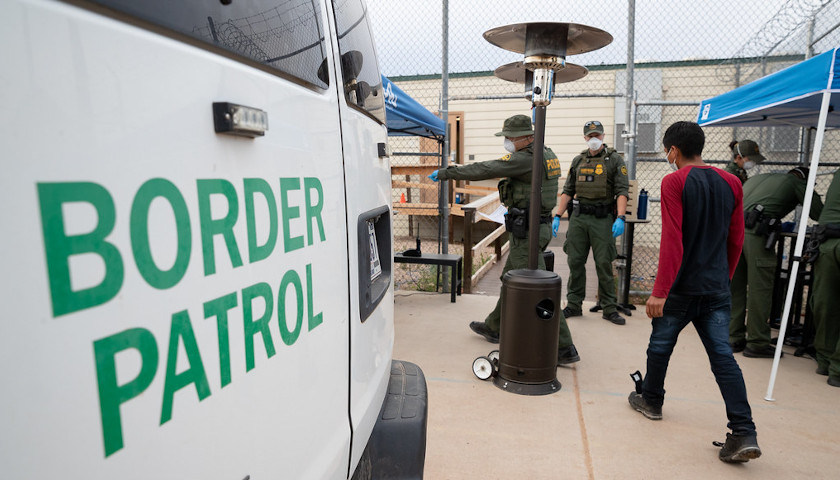by Bethany Blankley
Federal law enforcement officers arrested more than 17,300 migrants with past convictions of other crimes attempting to cross the border illegally last fiscal year. That’s up from 9,447 in fiscal 2020.
The federal government’s fiscal year runs from Oct. 1 through Sept. 30.
An additional 8,979 in fiscal 2021 were of migrants with outstanding arrest warrants against them from other law enforcement agencies.
Those migrants have been convicted of crimes including assault, battery, domestic violence, burglary, robbery, larceny, theft, fraud, driving under the influence, homicide, manslaughter, illegal drug possession and trafficking, illegal reentry, illegal weapons possession and transport and sex offenses, among others.
Of the total apprehensions, 27% were repeat offenders previously caught in the same fiscal year.
In fiscal 2021, Border Patrol agents arrested 10,763 criminal migrants, of which 1,904 had outstanding warrants.
Office of Field Operation agents encountered 6,567 criminal migrants, and arrested 8,979 individuals already in the National Crime Information Center database. NCIC arrests include citizens and noncitizens wanted by law enforcement agencies nationwide.
CBP regularly reports the types of criminals being arrested and processed for deportation nationwide. Many of the criminals apprehended had been convicted in other states prior to deportation and illegal reentry in Texas.
Among them, more than 1,900 were arrested in fiscal 2021 in the busiest sector along the southern border in the Rio Grande Valley in Texas.
One recent apprehension includes a Mexican national and Los Paisanos gang member with a prior conviction of illegally transporting people into the U.S. in 2008. He had been sentenced to 24 months in confinement and was subsequently deported, only to get caught reentering the U.S. illegally again in Hidalgo, Texas.
Agents also apprehended Salvadoran nationals who were either Mara-Salvatrucha (MS-13) gang members or 18th Street gang members in the RGV.
One Salvadoran national gang member, for example, had been convicted of accessory to murder after the fact and was sentenced to 10 years in prison in Maryland. He was later deported, only to be caught again reentering the U.S. illegally.
A Mexican national previously convicted of murder in Dallas in 1998 – who was previously deported – was also caught reentering the U.S. illegally again in the RGV.
Agents continue to apprehend registered sex offenders. One recent apprehension was of a previously removed Guatemalan national, Jose Yojcom-Rocche, who has an active warrant out of Los Angeles. The LAPD arrested him in 2019 for lewd or lascivious acts with a child under the age of 14, sentenced to 180 days confinement and five years probation.
Another recent apprehension was of Mexican national Humberto Tiburcio-Loyo, who was convicted in 2011 of sexually assaulting a 12-year-old child in Brownsville. He was sentenced to six years in prison, released, and deported earlier this year, only to reenter illegally.
Another recent apprehension was of Mexican national and registered sex offender Fredy Flores-Galeana, previously convicted and imprisoned for possession of child pornography. He was also deported only to reenter the U.S. illegally.
Another recently caught registered sex offender, Honduran national Jose Alfredo Nunez-Izaguirre, was previously convicted in California of a lewd or lascivious acts with a child under age 14. He was sentenced to five years confinement and was subsequently removed from the U.S., only to be caught reentering the U.S. illegally again.
Drug-related apprehensions also continue. Agents recently apprehended a Honduran national and MS-13 gang member who had been convicted in 2008 of accommodating the sale, possession of a controlled substance, and possession with intent to distribute cocaine in Virginia. He was sentenced to five years in prison for each of the charges and was subsequently removed from the U.S., only to reenter again.
In Val Verde County, roughly 200 miles northwest of the RGV, Sheriff Joe Martinez told The Center Square that there were roughly 60,000 known got-aways, those who evade capture, in his county alone. These are mostly single men who want to evade capture and aren’t surrendering to CBP seeking benefits or asylum.
While Border Patrol agents are dealing with a massive influx of people who are surrendering at the border, Martinez said, it’s the got-aways that keep law enforcement up at night. If the got-aways were caught, CBP criminal conviction apprehensions would be much higher, he and others in law enforcement said. Many of these individuals are also believed to be coming from “Special Interest Countries” identified by the U.S. Department of Homeland Security as generally being of concern to U.S. national security.
“What’s scary,” Martinez said, is “we don’t know where they [the got-aways] are going. How many were from terrorist groups from special interest countries?
“That’s the unknown.”
– – –
Bethany Blankley contributes to The Center Square.




